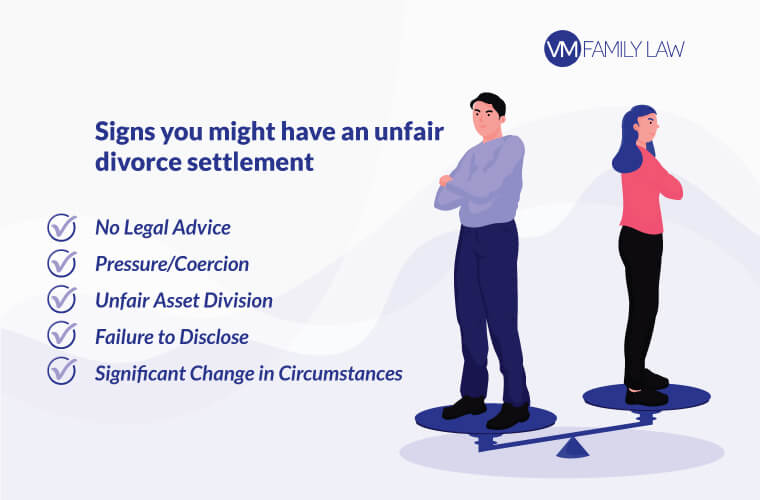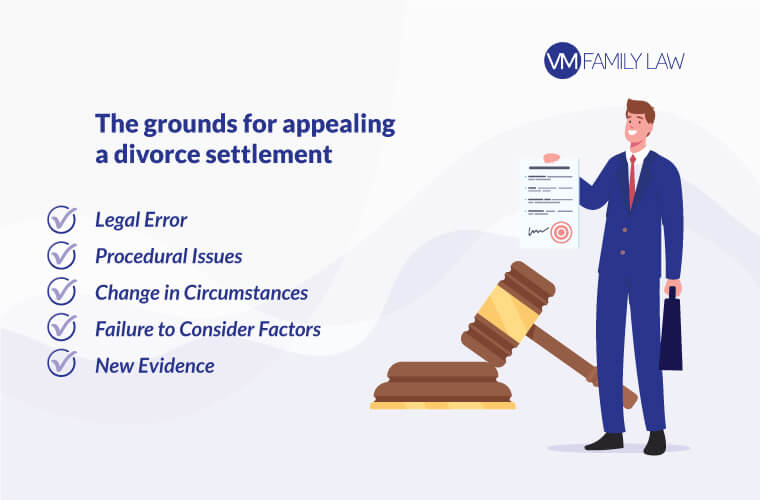When a marriage comes to an end, each party wants to ensure they receive what’s fair. Roughly 100,000 couples in England and Wales divorce each year, meaning they must deal with the tough questions of what’s fair.
Firstly, the idea that the law demands a 50/50 division of marital assets is a myth. Courts focus on what’s fair, not necessarily what’s equal. If you feel like your final divorce settlement is unfair, there are limited circumstances in which you can apply to have the settlement reopened. In this guide, we discuss the grounds for appealing a divorce settlement and what happens next.
Signs you might have an unfair divorce settlement

Divorces are often settled via compromise, meaning it’s extremely rare that either side gets everything they want. That alone isn’t a reason for challenging a settlement, but here are the main signs that your settlement could be inherently unfair:
- No Legal Advice – A lack of legal advice could indicate you agreed to terms when you didn’t understand your legal rights.
- Pressure/Coercion – If you were coerced or pressured into accepting a settlement, it could indicate that your settlement was unfair.
- Unfair Asset Division – Unequal distribution of assets isn’t inherently unfair, but if it’s heavily skewed, this could be grounds for an appeal.
- Failure to Disclose – When either party didn’t disclose all their assets or provided misleading information, the basis of the settlement may be compromised, and thus inherently unfair.
- Significant Change in Circumstances – Life-altering changes to financial circumstances soon after a settlement has been formalised may be grounds for an appeal. If these circumstances weren’t considered, it could mean an unfair outcome for the other party.
According to the Office for National Statistics, dissolution rates have decreased from their peak levels, but the burden on the Family Court remains immense. If you do plan to appeal, don’t be surprised if timelines are more stretched than usual.
Can you appeal a financial divorce settlement?
Appealing a financial divorce settlement is possible, but it can be complex and costly. Making alterations to a divorce settlement that has already been formalised is the exception, not the norm.
Unlike in other countries, there must be concrete proof that the basis of the original agreement was inherently prejudiced, such as non-disclosure of assets, failure to apply the law correctly, or a substantial change in circumstances.
It can be a complex process, and it’s expected that you’ll have to apply to a higher court than the one that made the original settlement. Generally, courts are more likely to agree to an appeal if you file soon after your initial settlement was finalised and you have justifiable reasons for seeking an appeal. For the best results, lodge your appeal within 21 days.
Can you renegotiate a divorce financial settlement?
It’s possible to renegotiate a financial settlement when it comes to divorce, but it’s difficult and renegotiations are only possible if both sides agree to renegotiate.
If this isn’t possible, either party can enlist a solicitor to help them formulate their arguments and lodge an application with the court to appeal the financial order.
The grounds for appealing a divorce settlement

Courts generally consider divorce settlements to be binding and indefinite. Shifting this position means that you must have specific grounds for an appeal and that these grounds would have led to a significant change in the original divorce settlement. Examples of what would allow you to appeal include:
- Legal Error: Misinterpretations or incorrect applications of the law by the original court. For example, this could mean an error in legal reasoning or a judge exceeding their power.
- Procedural Issues: Procedural errors may have prejudiced the original trial or the final decision. For example, this could be improperly disclosing evidence or breaching the court’s rules.
- Change in Circumstances: Rarely, a party might be able to argue that a significant change in circumstances has occurred shortly after the final order which wasn’t factored into the original settlement.
- Failure to Consider Factors: The Matrimonial Causes Act 1973 sets out what courts must consider when deciding on final settlements, including financial resources and earnings capacity. If these factors weren’t properly considered, this is grounds for an appeal.
- New Evidence: Evidence that wasn’t present before, whether through genuine mistakes or malicious acts, like fraud, can be the bedrock of a successful appeal.
Any appeal against an unfair divorce settlement must show one or more of these factors as you cannot appeal just because you do not like or disagree with the settlement.
How a divorce solicitor helps with challenging unfair divorce settlements
Appealing a divorce settlement requires negotiating a complex framework of court procedures and rules. Additionally, you’ll have to appeal to a higher court. These two facts alone are why hiring a divorce solicitor is crucial to ensuring your appeal doesn’t get held up as time is of the essence.
Successful appeals are relatively rare and require clear justification. Moreover, it’s not just about potential justification but outlining why that justification led to a material change in the fairness of the original order. Working with an experienced divorce solicitor is essential for presenting and arguing the intricacies of an appeal to green-light a renegotiation of an unfair settlement.
If you’re ready to learn more about preparing your appeal against an unjust divorce settlement, get in touch with us now.
